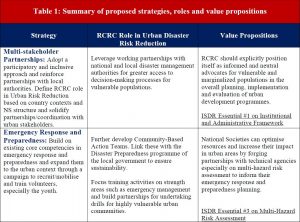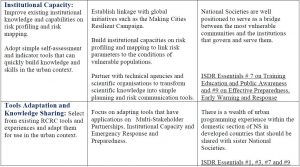Purpose:
This report is submitted following the contractual obligations of EMI to the IFRC Asia Pacific Zone for the project titled “Research Study to Identify Red Cross and Red Crescent Niche in Urban Community Resilience Programming in Asia Pacific.”
It presents the results of EMI’s analytical study and provides guidance to IFRC in determining its role in urban disaster risk reduction. It also provides additional information, materials, tools, methodologies and approaches that can be included in the existing Federation DRR and response materials/tools and highlights areas that require amendment to suit the urban context.
Overview:
The study identified four key issues that characterise existing RCRC programmes and activities in urban areas:
- Most of the DRR programmes and approaches have been designed for rural communities or adapted from rural experiences.
- There is limited experience in establishing systematic processes that access, gather and integrate information on city-level hazard, vulnerability and risk into programmes and policy formulation.
- National Societies lack adequate experience in working with local authorities, professional organisations, private sector, academia, and other local urban actors. They are also not integrated and active in global urban DRR/CCA initiatives.
- IFRC guidelines, training materials and manuals have been mostly designed for rural communities and National Societies face difficulties in adapting them to their national/local contexts.
Below is the proposition made by the study on several strategies to addres the gaps identified and build on RCRC strength and capabilities (for more information, see Executive Summary of the report, p. vi).
Usage: Policy reference
Audience: National Society leaders and managers
See also: The inception report of this research study [pdf, 0.83 MB]
![]()



